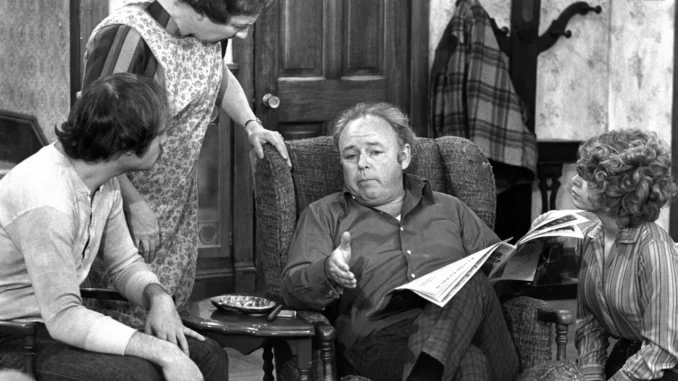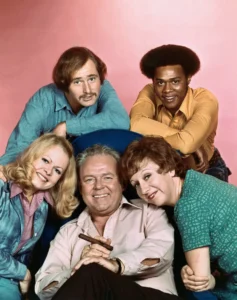
The following feature is adapted from LIFE’s special edition All in the Family: TV’s Groundbreaking Comedy, which recently celebrated its 50th anniversary.
Audiences watching TV on Tuesday, Jan. 12, 1971, probably wondered about the unusual disclaimer running ahead of All in the Family, letting them know that the new CBS program planned to throw “a humorous spotlight on our frailties, prejudices, and concerns.” The show then opens with Carroll O’Connor and Jean Stapleton, as their characters Archie and Edith Bunker, sitting side-by-side at a doily-draped spinet and singing the show’s theme song, “Those Were the Days”:
Boy, the way Glenn Miller played.
Songs that made the Hit Parade.
Guys like us, we had it made.
Those were the days.
The song brought to mind the comforting prewar music of the big bands. But while the elegiac piece by the composer/lyricist team of Charles Strouse and Lee Adams elicited memories of better days, it also had a whiff of the caustic social satire of The Threepenny Opera (by the German writer/composer duo Bertolt Brecht and Kurt Weill), as Archie evoked the era of Herbert Hoover, whose conservative presidency ushered in the Great Depression.
Viewers’ confusion quickly took hold. When Archie and Edith return from church to their home at 704 Hauser Street in Queens, New York, Edith tells him how horrified she is that he has just cursed the minister for his sermon. Gloria and Mike try to lighten the mood with an anniversary lunch they have prepared for the couple. But as the four sit down to celebrate, it takes no time for Archie to complain about the “Hebes,” “spics,” “spades,” “pinkos,” and atheists who have co-opted society, all the while tarring Edith as a “silly dingbat” and spewing his bile at Mike by calling him a “meathead.”

Most people had never seen anything like Archie Bunker (at least on their televisions)—a bullet-headed loading-dock worker who swills beer, smokes cheap cigars, and has a chip on his shoulder as wide as the Queensboro Bridge. Impatient, conservative, proudly bigoted, and malaprop-prone—he would say things like “Let him who is without sin be the rolling stone”—Archie was the furthest thing from the neighborly folks on Hee Haw, or for that matter, the paternal Jim Anderson on the 1950s show Father Knows Best, who sold insurance in his suburban paradise of Springfield.
CBS so worried about viewers’ responses to Archie, that they manned their phone lines with additional operators to field the expected barrage of angry callers. Few calls came, though, and only 15 percent of viewers welcomed the Bunkers into their living rooms. It wasn’t quite the tectonic reception creators Norman Lear and Bud Yorkin had hoped for. The press also had mixed takes on their show. While Variety called it “the best TV comedy since The Honeymooners,” LIFE magazine’s John Leonard branded it “a wretched program.”
For 13 weeks that spring Archie served up outrages like a rancid blue plate special, as Lear offered up issues never before printed in TV Guide’s menus. In the fourth episode, Archie decries Mike and Gloria’s ascot-wearing friend as a “fairy,” only to be stunned to learn that his linebacker pal Steve is gay. In another episode, Gloria gets pregnant and then miscarries.
Lear, who as a child felt powerless to respond to the hate he heard spewing from Father Charles Coughlin’s radio broadcasts, used his video soapbox to explore the racial divide, with the show being the first to display it for laughs as Archie deals with Italian neighbors, Jewish lawyers, and Puerto Rican New Yorkers. In the first episode audience members meet Lionel Jefferson, played by Mike Evans, the show’s main African American character, who needles Archie’s prejudices, and who, according to director John Rich, could “tease Archie in a way that is not offensive.”
Race proved to be an important issue throughout the series—one of the regular epithets Archie slings at Mike is “dumb Polack.” And just a few episodes into the first season, Archie is horrified to learn that a Black family has bought 708 Hauser Street, complaining that “the coons are coming.” Archie then realizes that Lionel’s parents, George and Louise, purchased the home. And George, the Jefferson patriarch, is as bullheadedly bigoted as Archie.
Characters like Archie, pining for the past, might have been new to television, but he was not a stretch in 1971. The year before, a violent confrontation broke out in New York’s Wall Street area as construction workers chanting “All the Way, USA” clashed with antiwar demonstrators in what became known as the Hard Hat Riot. And that July, Joe, a film about an outraged welder (played by Peter Boyle) who abhors the counterculture, hates that a “colored” family moved into his Queens neighborhood, and heads to a commune to slaughter its inhabitants, opened to critical and box office success.
With All in the Family, the discord on the nation’s streets had finally leaped from the nightly news to the nightly entertainment. People couldn’t help but cringe and take notice. And notice they did. That May, the show’s four leads introduced the Emmy Awards in a skit that depicted them watching the award ceremony from their Hauser Street living room, with Archie asking, “I wonder if Duke Wayne is up for anything. Probably not, with all them left-wingers runnin’ the whole of TV.” While John Wayne wasn’t up for an award, those “pinkos” working in TV bestowed three statuettes on All in the Family, one to Stapleton as best actress in a comedy series, and two to Lear, one for outstanding new series and another for outstanding comedy series.